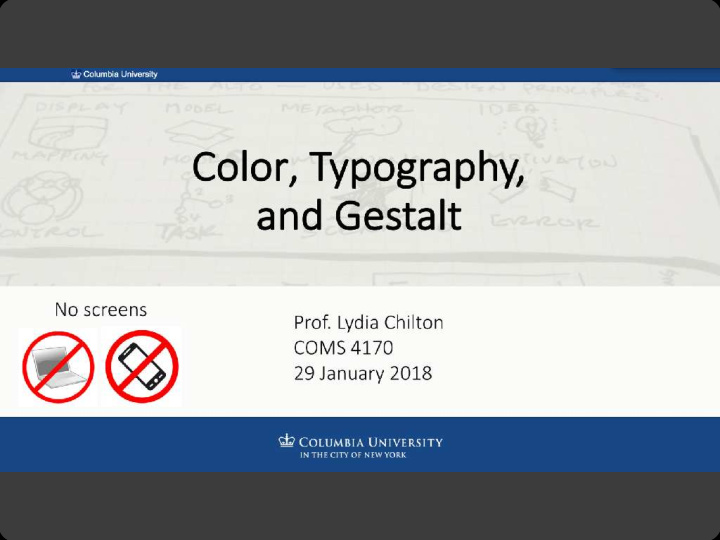



Goal 1 Build websites that suit the needs and abilities of users The main goal of many websites is to display information users need. 2
Tools for indicating importance in the visual information hierarchy • Conceptual grouping • Location • Whitespace • Size • Images • Contrast • Color 3
In addition to indicating importance, the colors and fonts you pick will have meaning to users. 4
What meaning will these colors have to users? (in addition to importance) 5
What meaning will these fonts have to users? (in addition to importance) 6
What meaning will these fonts, colors and design have to users? 7
What meaning does this font have? 8
The human brain is always perceiving meaning (even when it is not intended) 9
The human brain is always perceiving meaning (even when it is not intended) Use color, typography, and design carefully U to convey your intended meaning 10
Color
On the web, we mostly use RGB color. RGB Mixing amounts of Red, Green and Blue light 12
There are three perceptual dimensions of color 13
Every color is a point in the HSV space. 14
How would we find this color? 15
From Yellow, how do we get Brown? Saturation 16
Choosing colors � Start in grayscale, then keep the luminance values � Common schemes: analogous, split complement
Benefit from others � Adobe Color CC http://color.adobe.com � Fork popular schemes https://color.adobe.com/ explore/most-popular 19
Cultural Differences in Color Interpretation
What cultural connections do these colors have?
Are color meaning arbitrary?
Are color meaning arbitrary? Color meanings are not absolute. U But at any time and place, they may mean something you don’t intend.
Typography
Six Typographic Terms
} Six Typographic Terms Point size S S Gill Sans Calibri Calibri: 2005, Lucas de Groot for Microsoft, www.microsoft.com/typography/fonts/family.aspx?FID=287
Six Typographic Terms } Leading Six Typographic Terms
Six Typographic Terms } x-height Six Six Baskerville Gill Sans Low x-height Typefaces with low x-height: Typefaces with high x-height: harder to read at small point size easier to read at small point size Lucida Bright: 1993, Charles Bigelow & Kris Holmes · Baskerville, 1757, John Baskerville
ascenders Six Typographic Terms descenders
Six Typographic Terms regular bold light we ig ht
Weights and Styles http://developer.android.com/design/style/typography.html
Six Typographic Terms: Serif Source: R. Williams The Non-Designers Design Book
Six Typographic Terms: Serif ????? Source: R. Williams The Non-Designers Design Book
Six Typographic Terms: Serif Source: R. Williams The Non-Designers Design Book
Six Typographic Terms: Serif ????? Source: R. Williams The Non-Designers Design Book
Six Typographic Terms: Serif ????? Source: R. Williams The Non-Designers Design Book
Six Typographic Terms: Serif Source: R. Williams The Non-Designers Design Book
Six Typographic Terms: Sans Serif Source: R. Williams The Non-Designers Design Book
Small caps , lowercase 2002, Christian Schwartz, House Industries, http://www.houseind.com/fonts/neutraface · An Ode to a Typeface, www.youtube.com/watch?v=xHCu28bfxSI
Small caps , lowercase Numbers: 1234567890 Lowercase 1234567890 Uppercase 2002, Christian Schwartz, House Industries, http://www.houseind.com/fonts/neutraface · An Ode to a Typeface, www.youtube.com/watch?v=xHCu28bfxSI
The Serif Hypothesis • Serif typefaces are easier to read -- and thereby preferable for long stretches of text -- because the serifs provide anchors that guide the reader’s eye. Sans serif fonts lack these anchors and are therefore inappropriate for long stretches of text.
Challenges • Individual differences dwarf manipulation effects • i.e. , some people read faster than others. If there is an effect, it’s very small • Confound: Reading requires familiarity • Dependent Variable? Speed? Comprehension? …?
“Legibility, in practice, amounts simply to what one is accustomed to” — Eric Gill, 1931
Combining Type: Concordant
Combining Type: Contrasting
Combining Type: Conflicting
Typefaces, like everything, build reputations Baskerville Optima POUR HOMME The Literary Magazine for AFTER SHAVE BALM Gifted Kids & BAUME APRES RASAGE Their Families Hoefler + Frere-Jones: http://typography.com/ask/showBlog.php?blogID=79
Gestalt noun an organized whole that is perceived as more than a sum of its parts
What pattern do you see here?
What pattern do you see here?
Proximity
Proximity
How is proximity used?
What pattern do you see here?
How is similarity used?
What pattern do you see here?
What pattern do you see here? How are proximity and similarity used?
Connectedness Connection overrules proximity and similarity
What literal difference do you see between A B and C? A B C
What perceptual difference do you see between A B and C? A B C
Symmetry Bilateral symmetry gives strong sense of figure
Which paths are easier to follow?
Continuity We prefer smooth not abrupt changes Connections are clearer with smooth contours
What is the literal difference between a and b?
What is the perceived difference between a and b?
Closure
Illusory contours
What do you see?
Figure/Ground Principle of Relative Size
Figure/Ground
Figure/Ground Principle of Surroundedness
8 Gestalt Principles 73
Summary
The human brain is always perceiving meaning (even when it is not intended) Color Font Gestalt 75
As a designer, you have to know how these principles are represented by the system , and how they are interpreted by the user. Color Font Gestalt 76
Recommend
More recommend